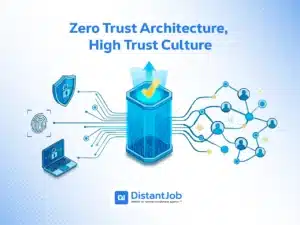Managing software development teams comes with unique challenges. One often overlooked issue is the constant digital noise developers face daily. From endless notifications to multiple project management tools, this digital clutter can significantly impact your team’s productivity and creativity. However, digital minimalism offers a solution. It aims to set clear boundaries and optimize technology use, thereby enhancing your team’s well-being and job performance. But what exactly is digital minimalism? And how can you implement it effectively in software development?
If you’re leading a software development team, this blog will guide you through digital minimalism and its implementation in your team’s workflow. You will learn how to boost productivity, reduce digital noise, and create a more focused development environment.
What is Digital Minimalism in Software Development?
Digital minimalism involves intentionally and selectively optimizing technology use to enhance your team’s productivity and overall well-being. To employ digital minimalism, the first action is to identify the essential technology that developers need to do their job effectively. Next, ruthlessly eliminate every other technology stack or tool that is of no use to the developers. The aim is to avoid your team being overwhelmed by unnecessary technology and digital tools that derail their workflows and output. For more on optimizing your remote team’s productivity, check out our article on tools for remote workers.
For example, consider your software development team working on a software design project. They need to be highly efficient, flexible, and consistent to achieve optimal results in the design’s fundamental concepts. As a leader, it’s your duty to ensure they are not bogged down by tools and technology that don’t add value to the overall output. Such non-essential digital distractions should be minimized or eliminated.
How Digital Minimalism Works in Software Development
Software developers use a lot of digital technologies, many of which designers purposely make very addictive. Digital minimalism advocates for a more conscious and intentional use of this technology as a tool to enhance a developer’s well-being rather than allowing it to use them. Because efficiency and focus are paramount in this field to achieve optimal results, minimizing digital clutter and distractions can significantly impact workflows and output. This focus on efficiency extends beyond personal productivity – many companies are now analyzing how much it costs to hire remote vs. local developers to maximize both productivity and budget efficiency.
What are the Three Principles of Digital Minimalism?
The principles of digital minimalism in software development outline several strategies to promote your team’s thoughtful engagement with technology. Here are the three main principles or steps you should take to achieve digital minimalism:
1. Digital Declutter
From the word ‘declutter,’ the concept of a “digital declutter” follows the same script. You eliminate the digital technology you don’t need to create a more focused and streamlined work environment.
This could be an application, a browser extension tool, or even a platform you use daily. During digital declutter, identify which digital tools and technologies are truly essential to your work while taking time off from non-essential ones.
A digital declutter leaves room to reintroduce technologies you’ll need later on. Additionally, it allows for the inclusion of those that may align with your work along the way.
2. Prioritize Certain Tools
After you declutter non-essential tools and technologies, prioritize the tools or technologies needed for the task at hand. For example, this could be a programming language or a relevant framework.
By maintaining a narrow focus on the most important tools and technologies, your team can devote their time and efforts to developing deeper expertise. This prevents them from spreading themselves thin.
3. Reduce Cognitive Load
Software development is demanding, and your team’s ability to concentrate and be productive might be compromised by excessive cognitive load. Digital minimalism ensures that your team does not face a cognitive load from too many tools and technologies at work.
Begin reducing cognitive load by simplifying the tools in use and minimizing their usage frequency. For instance, when your developers aren’t overwhelmed with too many emails and other distractions, they can focus and deliver useful output.
What are the Benefits and Challenges of Digital Minimalism in Software Development?
Embracing a more minimalist approach to your software development solutions can have benefits such as:
1. Increased Productivity
Digital minimalism encourages a distraction-free work environment that allows developers to handle tasks more efficiently. They can easily focus on what’s important if they’re not overwhelmed by too much digital clutter.
2. Enhanced Creativity
When you have fewer distractions and develop a minimalist approach to the technologies you use, you increase the chances of remaining focused in what you do. Practicing digital minimalism such as avoiding the need to switch between different tools allows for higher concentration, which opens your team’s creative potential to come up with more innovative solutions.
3. Reduced Stress and Burnout
For most remote teams, developer burnout is a real concern emanating from the constant bombardment of digital stimuli. You can easily reduce this risk among your development teams by embracing digital minimalism to ensure they feel calm and in control.
Challenges of Digital Minimalism in Software Development
There are numerous benefits to reducing the technologies at use, freeing up time, and adopting a minimalist approach at work. However, your teams may also face the following challenges when implementing digital minimalism.
1. Time-consuming
It takes time to eliminate things and fully implement digital minimalism. For example, you first need to sort out the prioritized technologies and align your teams on how to get the most out of them. This may take more time than expected.
2. Compatibility Concerns
The solutions you currently use are part of a larger ecosystem where various tools and platforms are used together. It could prove challenging for your development teams to implement minimalistic solutions into their existing workflows without incompatibility issues.
Tips to Assess Your Current Digital Environment
Before implementing the digital decluttering process, take a step back and evaluate your current dev environment. Start by setting your objectives straight and what you’re trying to achieve through digital transformation.
This makes it easier to assess areas that could benefit from a minimalist approach and how you can follow up to optimize workflows for maximum developer productivity.
1. Identify Your Digital Footprint
Examine the digital tools, platforms, and apps that your developers use. This allows you to know which ones are necessary for ongoing workflows, what you need, and most importantly, what amounts to digital clutter.
2. Consolidate Communication Channels
Software development teams rely heavily on their ability to communicate and the tools available for collaboration. However, over-collaborating could lead to digital clutter. Look out for communication tools or technologies you don’t use often and find a way to consolidate them with others.
3. Analyze Your Data Management
Examine your digital files and information storage, categorisation and retrieval systems. Next, you can implement digital minimalism to organize them such that they can be easily recovered and stored efficiently.
4. Track Your Digital Distractions
Be clear on where digital distractions come from. Then, implement ways to ease them, such as setting limits on how to use online tools and using productivity tools for developers.
Conclusion
When you adopt digital minimalism in software development, you set your team on a path to focus on the tools and processes that genuinely add value to their work. It’s a necessary step you should take to optimize your workflows and build a more focused work environment.
One of the first steps to ensure you achieve digital minimalism is by building a team of developers that understand their roles perfectly. DistantJob can help you unlock the full potential of your software development team by taking care of your developer recruitment needs.
We have a team of professionally vetted remote software developers ready to help you build a high-performing, efficient, and streamlined digital infrastructure tailored to your unique business needs. Contact us today to learn how we can assist you in your digital transformation journey.





